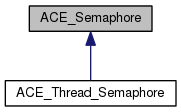|
ACE
6.1.0
|
|
ACE
6.1.0
|
Wrapper for Dijkstra style general semaphores. More...
#include <Semaphore.h>

Public Member Functions | |
| ACE_Semaphore (unsigned int count=1, int type=USYNC_THREAD, const ACE_TCHAR *name=0, void *=0, int max=0x7fffffff) | |
| Initialize the semaphore, with initial value of "count". | |
| ~ACE_Semaphore (void) | |
| Implicitly destroy the semaphore. | |
| int | remove (void) |
| int | acquire (void) |
| int | acquire (ACE_Time_Value &tv) |
| int | acquire (ACE_Time_Value *tv) |
| int | tryacquire (void) |
| int | release (void) |
| int | release (unsigned int release_count) |
| int | acquire_read (void) |
| int | acquire_write (void) |
| int | tryacquire_read (void) |
| int | tryacquire_write (void) |
| int | tryacquire_write_upgrade (void) |
| void | dump (void) const |
| Dump the state of an object. | |
| const ACE_sema_t & | lock (void) const |
| Return the underlying lock. | |
Public Attributes | |
| ACE_ALLOC_HOOK_DECLARE | |
| Declare the dynamic allocation hooks. | |
Protected Attributes | |
| ACE_sema_t | semaphore_ |
| bool | removed_ |
Private Member Functions | |
| void | operator= (const ACE_Semaphore &) |
| ACE_Semaphore (const ACE_Semaphore &) | |
Wrapper for Dijkstra style general semaphores.
| ACE_Semaphore::ACE_Semaphore | ( | unsigned int | count = 1, |
| int | type = USYNC_THREAD, |
||
| const ACE_TCHAR * | name = 0, |
||
| void * | arg = 0, |
||
| int | max = 0x7fffffff |
||
| ) |
Initialize the semaphore, with initial value of "count".
| ACE_Semaphore::~ACE_Semaphore | ( | void | ) |
Implicitly destroy the semaphore.
| ACE_Semaphore::ACE_Semaphore | ( | const ACE_Semaphore & | ) | [private] |
| int ACE_Semaphore::acquire | ( | void | ) | [inline] |
Block the thread until the semaphore count becomes greater than 0, then decrement it.
| int ACE_Semaphore::acquire | ( | ACE_Time_Value & | tv | ) | [inline] |
Block the thread until the semaphore count becomes greater than 0 (at which point it is decremented) or until tv times out (in which case -1 is returned and errno == ETIME). Note that tv is assumed to be in "absolute" rather than "relative" time. The value of tv is updated upon return to show the actual (absolute) acquisition time.
| int ACE_Semaphore::acquire | ( | ACE_Time_Value * | tv | ) | [inline] |
If tv == 0 then call <acquire()> directly. Otherwise, Block the thread until the semaphore count becomes greater than 0 (at which point it is decremented) or until tv times out (in which case -1 is returned and errno == ETIME). Note that <*tv> is assumed to be in "absolute" rather than "relative" time. The value of <*tv> is updated upon return to show the actual (absolute) acquisition time.
| int ACE_Semaphore::acquire_read | ( | void | ) | [inline] |
Acquire semaphore ownership. This calls <acquire> and is only here to make the ACE_Semaphore interface consistent with the other synchronization APIs.
| int ACE_Semaphore::acquire_write | ( | void | ) | [inline] |
Acquire semaphore ownership. This calls <acquire> and is only here to make the ACE_Semaphore interface consistent with the other synchronization APIs.
| void ACE_Semaphore::dump | ( | void | ) | const |
Dump the state of an object.
Reimplemented in ACE_Thread_Semaphore.
| const ACE_sema_t & ACE_Semaphore::lock | ( | void | ) | const [inline] |
Return the underlying lock.
| void ACE_Semaphore::operator= | ( | const ACE_Semaphore & | ) | [private] |
| int ACE_Semaphore::release | ( | void | ) | [inline] |
Increment the semaphore by 1, potentially unblocking a waiting thread.
| int ACE_Semaphore::release | ( | unsigned int | release_count | ) | [inline] |
Increment the semaphore by release_count, potentially unblocking waiting threads.
| int ACE_Semaphore::remove | ( | void | ) | [inline] |
Explicitly destroy the semaphore. Note that only one thread should call this method since it doesn't protect against race conditions.
| int ACE_Semaphore::tryacquire | ( | void | ) | [inline] |
Conditionally decrement the semaphore if count is greater than 0 (i.e., won't block). Returns -1 on failure. If we "failed" because someone else already had the lock, errno is set to EBUSY.
| int ACE_Semaphore::tryacquire_read | ( | void | ) | [inline] |
Conditionally acquire semaphore (i.e., won't block). This calls <tryacquire> and is only here to make the ACE_Semaphore interface consistent with the other synchronization APIs. Returns -1 on failure. If we "failed" because someone else already had the lock, errno is set to EBUSY.
| int ACE_Semaphore::tryacquire_write | ( | void | ) | [inline] |
Conditionally acquire semaphore (i.e., won't block). This calls <tryacquire> and is only here to make the ACE_Semaphore interface consistent with the other synchronization APIs. Returns -1 on failure. If we "failed" because someone else already had the lock, errno is set to EBUSY.
| int ACE_Semaphore::tryacquire_write_upgrade | ( | void | ) | [inline] |
This is only here to make the ACE_Semaphore interface consistent with the other synchronization APIs. Assumes the caller has already acquired the semaphore using one of the above calls, and returns 0 (success) always.
Declare the dynamic allocation hooks.
Reimplemented in ACE_Thread_Semaphore.
bool ACE_Semaphore::removed_ [protected] |
Keeps track of whether remove() has been called yet to avoid multiple remove() calls, e.g., explicitly and implicitly in the destructor. This flag isn't protected by a lock, so make sure that you don't have multiple threads simultaneously calling remove () on the same object, which is a bad idea anyway...
ACE_sema_t ACE_Semaphore::semaphore_ [protected] |
 1.7.5.1
1.7.5.1